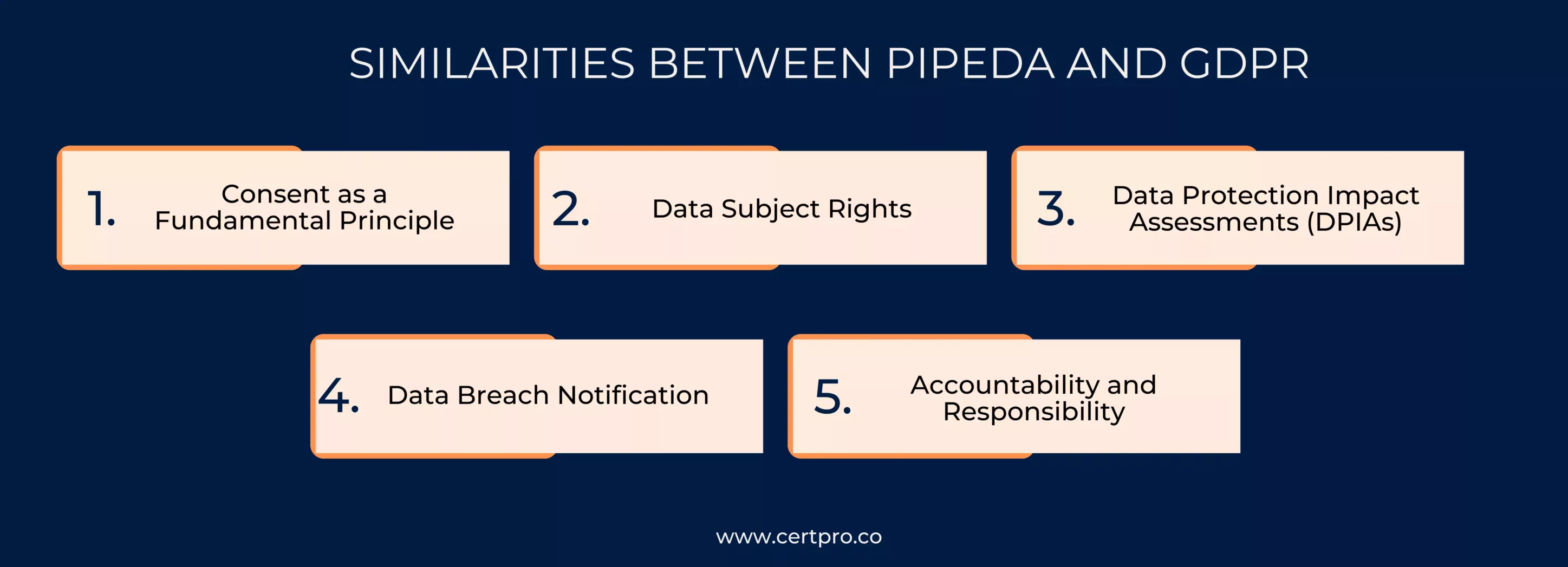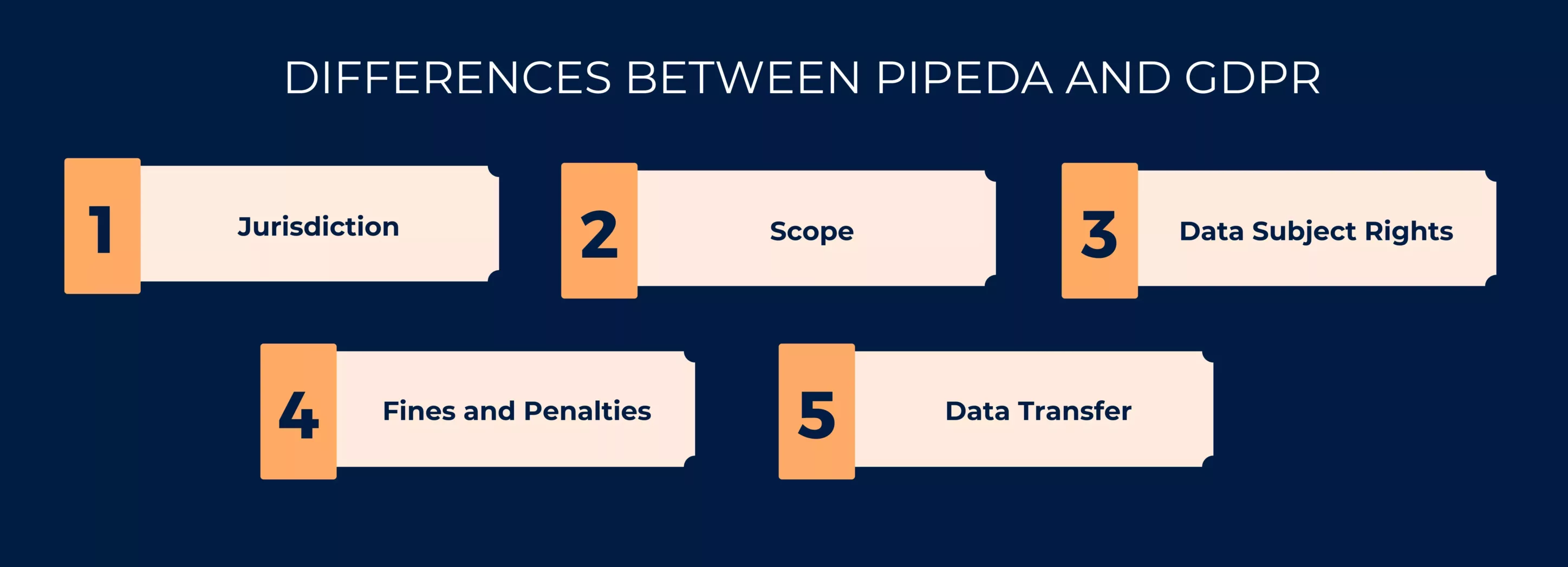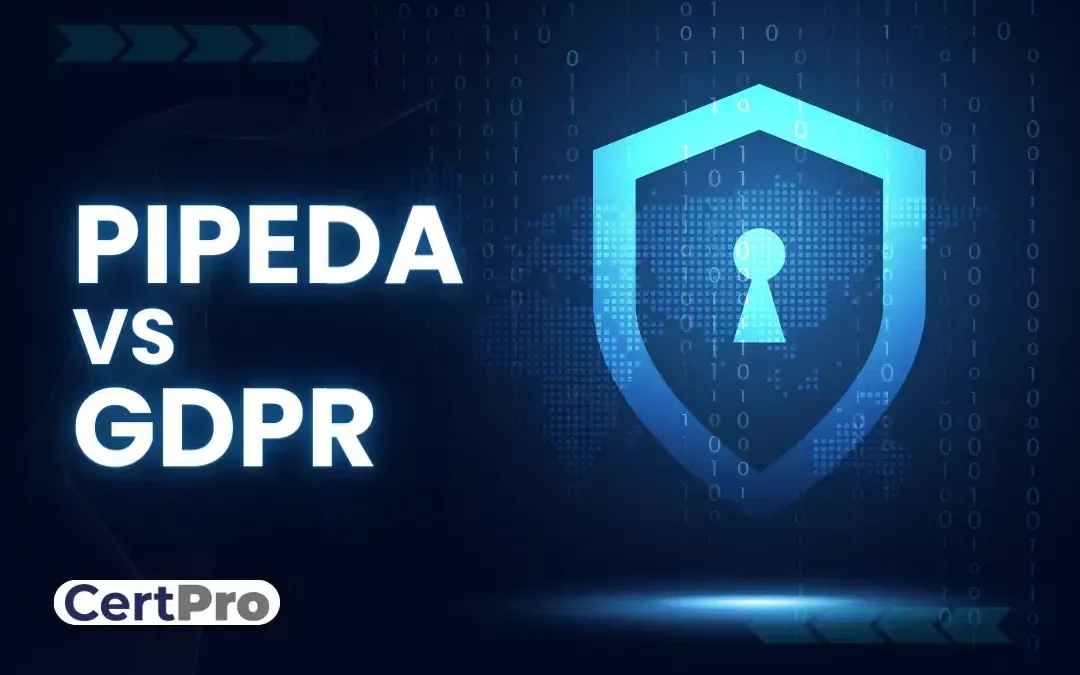The Personal Information Protection and Electronic Documents Act (PIPEDA) and the General Data Protection Regulation (GDPR) are two strong frameworks in the area of international data protection, with distinct international consequences for each. A unifying objective of these laws is to protect people’s rights to privacy in an increasingly digital society. They do, however, show important similarities and differences that businesses must comprehend in order to successfully negotiate the complex world of data privacy compliance. This PIPEDA vs GDPR comparison analysis explores the fundamental parallels and divergences between these two significant data protection regimes, illuminating their significant consequences for businesses doing business in Canada and the European Union.
In the PIPEDA GDPR comparison, both laws place a high priority on consent, the cornerstone of data processing. They require companies to put security measures in place to protect customer information, and they give customers the right to access, correct, and delete their own data.
This article analyzes the key differences between PIPEDA VS GDPR: SIMILARITIES AND DIFFERENCES, offering light on their differing geographic ranges and definitions of personal data as we delve into the nuances of both legislations. Through this investigation, we will better comprehend how these rules influence how PIPEDA and GDPR differ from one another.
WHAT ARE PIPEDA AND GDPR
PIPEDA (Personal Information Protection and Electronic Documents Act):
In 2000, Canada enacted a privacy law known as PIPEDA, aimed at regulating how private-sector companies gather, utilize, and disclose personal information. PIPEDA’s primary goal is to strike a balance between safeguarding individuals’ rights to privacy and promoting the expansion of internet commerce. The Office of the Privacy Commissioner of Canada governs this law, and it applies to all commercial activities conducted across the country.
Some of PIPEDA’s key characteristics, which align with PIPEDA GDPR Comparison, include obtaining informed consent from individuals before collecting their personal information, providing individuals with the opportunity to access and amend their data, and mandating that companies be open and honest about their data practices. This commitment to transparency, consent, and data subject rights reflects internationally recognized best practices in data privacy and ensures that individuals have greater control over their personal information in an increasingly digital world.
GDPR (General Data Protection Regulation):
On the other hand, the European Union (EU) passed GDPR in 2018, which is a thorough data protection policy. It stands for one of the strictest and most comprehensive data privacy laws in the world. The main goal of GDPR is to unify data protection legislation among EU member states while giving people more choice over their personal data. Notably, the GDPR also has extraterritorial applicability, which means that if an entity processes the personal data of EU citizens, it is subject to its requirements.
The strict requirement that businesses get explicit and freely given consent for data processing is one of the key components of GDPR. Another is the provision of numerous data subject rights, such as the ability to access, amend, and request the erasure of personal data (often known as the “right to be forgotten”). Among its core components, GDPR places a strict requirement on businesses to obtain explicit and freely given consent for data processing, aligning with PIPEDA GDPR Comparison.
SIMILARITIES BETWEEN PIPEDA AND GDPR
The Personal Information Protection and Electronic Documents Act (PIPEDA) and the General Data Protection Regulation (GDPR), two privacy laws, were passed in the European Union and Canada, respectively. Despite their geographical separation, they have a number of things in common when it comes to data protection policies and goals:
1. Consent as a Fundamental Principle:
The consent concept is given priority under both PIPEDA and GDPR. Before processing a person’s personal data, they mandate that organizations seek the person’s explicit, informed, and voluntary consent. The consent must be easy to revoke and tailored to the purpose.
2. Data Subject Rights:
Both laws give people a lot of rights when it comes to their personal information. These rights include the ability to access their information, correct any errors, and, in some circumstances, ask for the deletion of their data. These rights give people more power to manage their data.
3. Data Protection Impact Assessments (DPIAs):
Organizations are encouraged or mandated by PIPEDA and GDPR to complete Data Protection Impact Assessments. These evaluations assist organizations in identifying and reducing privacy risks linked to data processing operations, ensuring that data security is incorporated into procedures from the beginning.
4. Data Breach Notification:
Both PIPEDA and GDPR set standards for data breach notification. Organizations are required to notify the appropriate authorities—and, in some situations, the affected individuals—as soon as they become aware of a data breach. This emphasis on breach notification attempts to increase openness and give people time to take the appropriate safety measures.
5. Accountability and Responsibility:
Both frameworks stress how crucial it is for businesses to be in charge of their data processing activities. Organizations are required to put protections in place to secure personal information and to explicitly identify their data processing methods.

DIFFERENCE BETWEEN PIPEDA AND GDPR
Both the PIPEDA (Personal Information Protection and Electronic Documents Act) and the GDPR (General Data Protection Regulation) are laws governing privacy; however, they apply to different countries and have several important distinctions:
1. Jurisdiction:
- PIPEDA: The Canadian privacy law known as PIPEDA is applicable to businesses in the private sector that gather, utilize, or divulge personal data for commercial purposes. It applies to companies operating both within and outside of Canada that gather infromation of canadians.
- GDPR: The GDPR is a rule of the European Union that is relevant to all EU member states. Its worldwide reach extends to organizations outside the EU that process the personal data of EU citizens.
2. Scope :
- PIPEDA:Governmental agencies and non-profit organizations are not covered by PIPEDA unless they are involved in commercial activity, as it primarily focuses on the protection of personal information in business transactions.
- GDPR: The GDPR has a larger range of organizations covered by it, including both public and private sector organizations. It also applies to any processing of personal data, whether or not it is done for profit.
3. Data Subject Rights:
- PIPEDA:People have the right to see the personal information that organizations have about them, ask for changes to be made, and complain to the Canadian Privacy Commissioner.
- GDPR: More broad rights are granted to data subjects under GDPR, including the ability to access, update, delete (the “right to be forgotten”), and transfer their personal information. The right to know about data breaches is also introduced.
4. Fines and Penalties:
- PIPEDA: Although they are not common, PIPEDA permits fines for non-compliance.
- GDPR: With fines that can reach millions or 4% of the global annual revenue of the prior fiscal year, whichever is higher, the GDPR imposes more severe penalties.
5. Data Transfer:
- PIPEDA: There are no specific limitations on cross-border data transfers under PIPEDA.
- GDPR: For example, GDPR stipulates that data transfer agreements or adequacy determinations for non-EU nations are necessary for transferring personal data outside the EU.

MANAGING DATA PRIVACY IN A GLOBAL SETTING WITH CERTPRO
The comparison between PIPEDA and GDPR underscores the critical importance of data protection and privacy in today’s digital landscape, regardless of whether you are conducting business in Canada or the European Union. CertPro, a renowned ISO 27701 consulting services provider, plays a vital role in helping businesses navigate the intricate world of data privacy compliance. Just as ISO 27701 certification enhances an organization’s data protection practices, CertPro’s expertise fortifies an enterprise’s ability to comply with both PIPEDA GDPR COMPARISON . By entrusting CertPro, businesses gain a valuable partner dedicated to excellence and efficiency in the pursuit of ISO 27701 accreditation and, by extension, enhanced data security and privacy. With CertPro by their side, organizations can assert their commitment to data security and privacy, positioning themselves as leaders in a competitive business environment.
FAQ
What is PIPEDA, and what is GDPR?
The federal privacy law of Canada, known as PIPEDA (Personal Information Protection and Electronic Documents Act), governs how private-sector businesses handle personal data. The General Data Protection Regulation (GDPR), which is applicable to all EU member states, is the comprehensive data protection law of the European Union.
What are the key similarities between PIPEDA and GDPR?
Both PIPEDA and GDPR emphasize the importance of permission, data protection, openness, and breach reporting. They give people access to and rectification of their personal data rights.
How do PIPEDA and GDPR differ in terms of jurisdiction?
While GDPR is applicable to all EU members, PIPEDA only applies to Canada. The GDPR affects international businesses that process the data of EU citizens.
Does GDPR require organizations to appoint Data Protection Officers (DPOs)?
Yes, GDPR mandates the appointment of DPOs for certain organizations, whereas PIPEDA does not have such a requirement.
What are the implications for businesses operating in both the EU and Canada regarding PIPEDA and GDPR compliance?
To successfully traverse the complicated world of data privacy compliance, businesses operating in both countries must be aware of and compliant with the PIPEDA and GDPR standards.

About the Author
RAGHURAM S
Raghuram S, Regional Manager in the United Kingdom, is a technical consulting expert with a focus on compliance and auditing. His profound understanding of technical landscapes contributes to innovative solutions that meet international standards.
HOW DOES THE NIST CYBERSECURITY FRAMEWORK FUNCTION, AND WHY IS IT IMPORTANT?
Emerging cyber threats make cybersecurity an essential consideration for organizations handling and managing data. In this regard, the NIST cybersecurity framework applies to improving your cybersecurity program. It is a set of guidelines that helps improve your...
UNDERSTANDING ISO 42001: A GUIDE FOR RESPONSIBLE AI MANAGEMENT SYSTEMS
The invention of artificial intelligence (AI) has changed the operational processes of many industries. However, the rapid growth of technology increases ethical, security, and privacy-related concerns. Therefore, the International Organization for Standardization...
EUROPEAN UNION’S ARTIFICIAL INTELLIGENCE ACT: HOW THIS GROUNDBREAKING LAW AFFECTS YOUR BUSINESS
Nowadays, Artificial Intelligence (AI) is transforming our lives exceptionally well. AI is now streamlining healthcare services, providing virtual assistance, and fulfilling queries. Technologies have boons and curses. Similarly, AI creates many concerns about...




